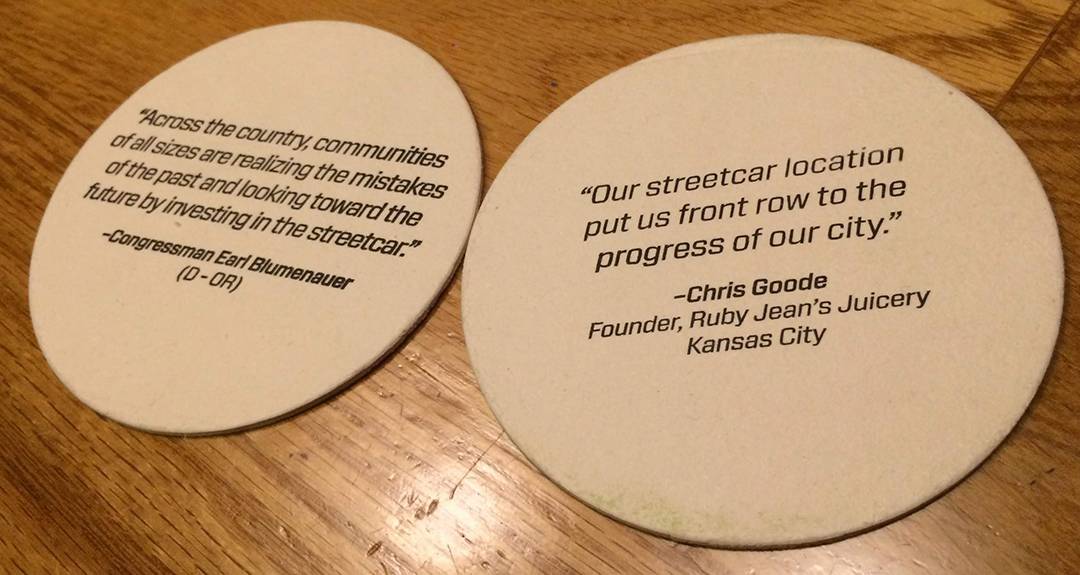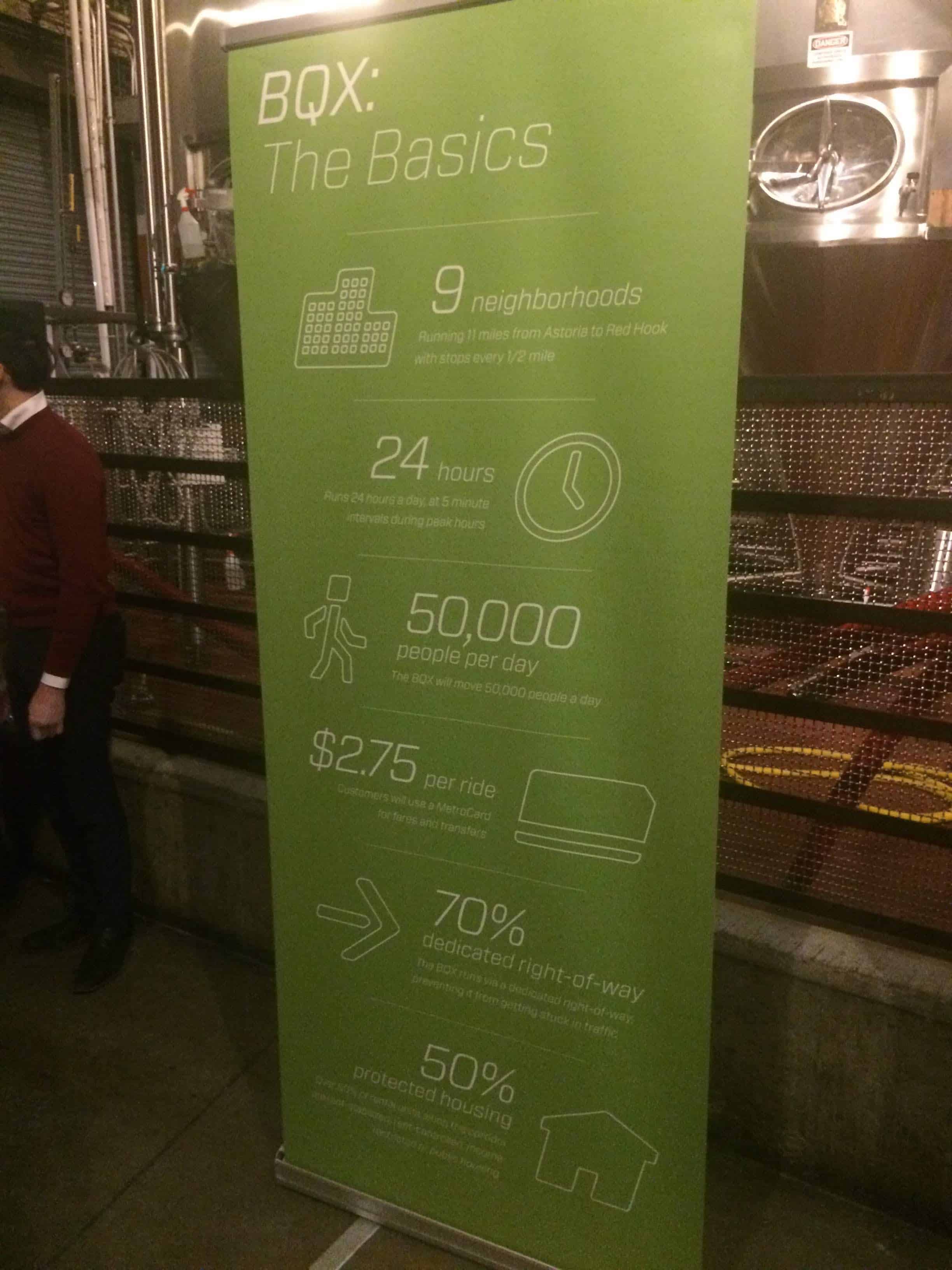
Friends of the BQX, an advocacy group backed by developers Two Trees Management and the Durst Organization, continues to push for the $2.73-billion Brooklyn-Queens Connector light rail project favored by Mayor de Blasio and local real estate interests. Most recently, the Friends held an event for small business owners at the Brooklyn Brewery in Williamsburg on March 5. Called “BQX Conversations: Real Impacts on Local Business,” the forum brought together entrepreneurs from across the country to testify as to how streetcars have benefited their cities – and how the BQX might benefit commercial enterprises in Brooklyn and Queens.
Inside the brewery, attendees mingled among a well-catered buffet, an open bar with 18 taps, and freestanding posters showcasing the triumphs of light rail systems in places like Toronto and Los Angeles. Tablecloths displayed the proposed route for the BQX, and rapturous quotations about “looking toward the future by investing in the streetcar” emblazoned specially made coasters.
To rent out the Brooklyn Brewery on a Tuesday evening, pricing starts at $4,300, though co-founder Steve Hindy, a vocal BQX supporter, may have offered a discount in this case. Despite all the expense put forth, however, rumblings in the crowd suggested that Amazon’s withdrawal from Long Island City may have already doomed the BQX. In November, the promise of HQ2 had reinvigorated de Blasio’s pro-streetcar campaign, which highlighted the need for outer-borough transit options to keep pace with new waterfront investment.
Since then, however, City Hall has seen the danger of imposing large-scale, unwanted development within neighborhoods already perceived to be at risk of gentrification. In February, de Blasio nevertheless went ahead and commissioned a $7.25-million Environmental Impact Study for the streetcar, but much of the wind still appears to have left the BQX’s sails, with the Brooklyn Daily Eagle, Gothamist, The Real Deal, and Crain’s all having issued pessimistic forecasts in recent months.
Congressman a no-show
Although the mailed invitation for “BQX Conversations” had promised a visit from Oregon congressman Earl Blumenauer, Brooklyn Borough President Eric Adams ultimately stepped in as moderator instead. Queens Borough President Melinda Katz also made an appearance, and Senator Chuck Schumer’s daughter Jessica Schumer, executive director of Friends of the BQX, subsequently introduced a panel of four out-of-towners whom the group had flown into New York and wined and dined in exchange for their light rail wisdom.
Aaron Barthel is a chocolatier in Seattle, Washington. Isabel Chanslor is a vice president at the Neighborhood Development Center in St. Paul, Minnesota. Chris Goode owns a chain of juice bars in Kansas City, Missouri, and Rick Gustafson formerly served as the executive director of Portland Streetcar, Inc., in Oregon. They all like streetcars a lot.
“The 21st century deserves a 21st-century transportation system,” Adams began. But some serious concerns had to be addressed first. His opening question for the panel asked about the challenges faced by businesses along future streetcar routes during construction, when heavy machinery can scare away customers.
“In all reality, it is a big impact,” said Barthel, whose chocolate shop survived on wholesale profits during the jackhammer-induced retail drought. Still, he encouraged shopkeepers to make the most of an unappealing opportunity. “Find a way to beautify the construction site. Can you take barriers and make them into an art project? Or hang lights. Make it so it’s an arcade at night.”
Chanslor explained that her nonprofit had provided loans, information, and marketing assistance to sustain storeowners in St. Paul during the four-year slowdown before the opening of the Metro Green Line. Only four businesses within her University Avenue Business Preparation Collaborative shuttered.
Trolley is good business
Goode acknowledged that he had leased his juice bar’s space partway through the construction timeline of the KC Connector, stashing the property in anticipation of increased customer traffic in the area after completion. Gustafson claimed that, by working with the city to resolve logistical issues, business owners can reduce the length of the construction period affecting them – as did Michael Powell, the founder of Powell’s Books, who helped trim a planned six-month work period outside his bookstore to six weeks. “Get involved,” Gustafson instructed.
Adams also brought up the issue of displacement, which Barthel interpreted literally, stating that displacement had been a nonissue in Seattle because the streetcar ran along existing roads (thus not requiring the demolition of any habitable structures). In Kansas City, which between 2014 and 2016 constructed a free light rail line as a novelty to renew public interest in its stagnant downtown, rents have remained “reasonable,” according to Goode.
Chanslor noted that some businesses in St. Paul had seen significant rent hikes in the wake of the light rail but that, for many businesses, revenue had risen 40 to 60 percent. No one directly addressed what would happen to residential tenants who might see a similar rent increase without an offsetting boost in income.
“We are worried about gentrification,” Chanslor insisted. “It takes a community working together to truly prevent these things from happening.” Still, as she later put it, “progress is progress. Growth is growth.”
In the end, all four guests agreed that the streetcars in their respective cities had been successes. And in the words of Gustafson, the BQX “has success written all over it.”









